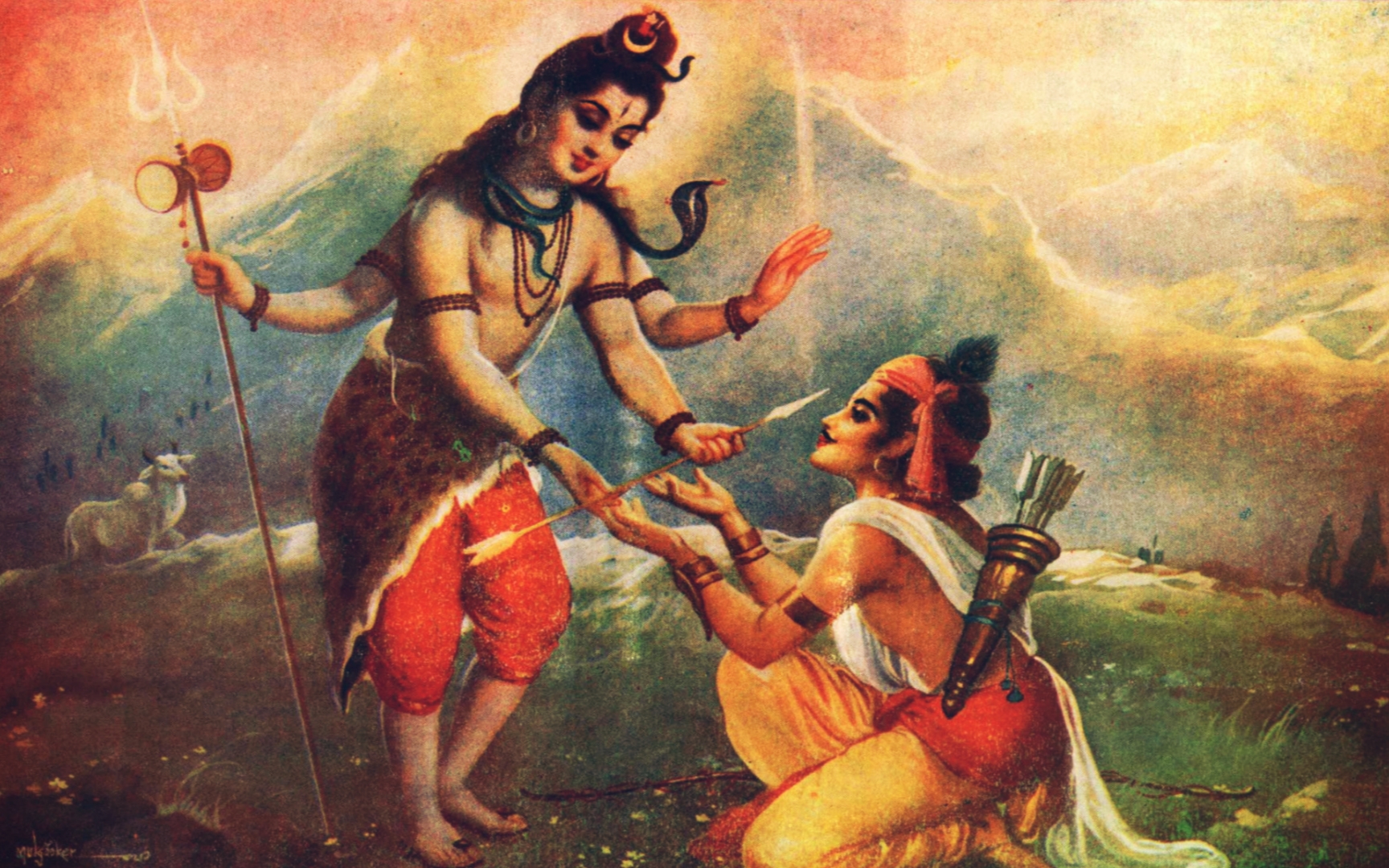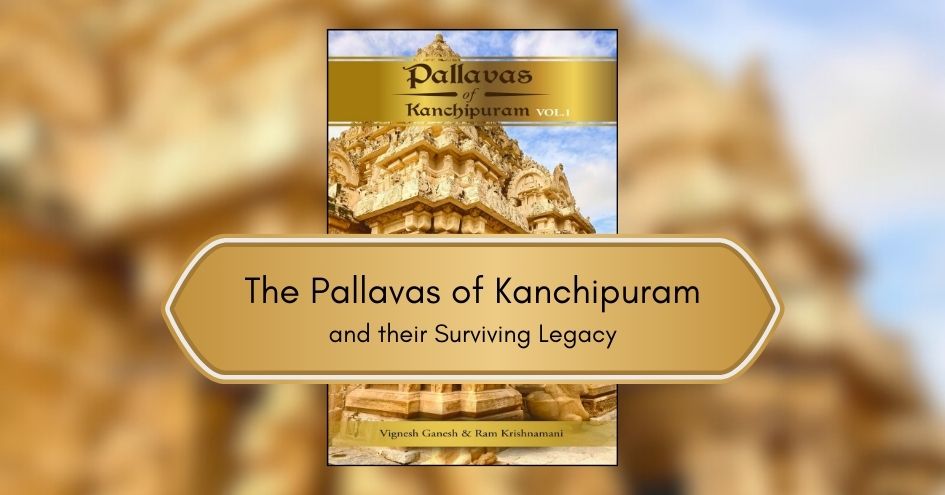
Mahakavi Bharavi is known for his immortal epic ‘Kirataarjuneeyam’. Its main theme is the ferocious fight between Lord Shiva and Arjuna. Towards the end of the Pandavas’ exile, Arjuna leaves to propitiate Lord Shiva and receive the powerful weapon, Paashupata Astra from Him. After a long penance, Arjuna is able to please Shiva. Nevertheless, Shiva wants to test Arjuna’s prowess. He appears in front of Arjuna in the form of a Kirata (a tribal from a mountain) and creates an opportunity to fight with him. Arjuna brings out all his skill to defeat the Kirata, which is not easy. The thoroughly impressed Shiva appears in front of Arjuna in His true form and presents the Astra to Arjuna.
The above couplet appears in the course of this story, before Arjuna leaves for his penance.
Very little authentic information is available about this great poet ‘Bharavi’ , whose name means ‘lustre of the Sun’. However, certain facts are accepted as probably true. His original name was Damodara and he seems to have flourished during the reigns of the King Durvinita of the Western Ganga dynasty and King Simhavishnu of the Pallava dynasty.
Bharavi’s poetry is characterized by its intricate styles and lofty expressions. If Kalidasa is famous for his similes, (‘Upama Kalidasasya’) Bharavi is celebrated for his ‘Weight of meaning’ (Arthagauravam).
(उपमा कालिदासस्य भारवेरर्थगौरवम् ।)
There is an interesting story about the shloka, ‘Sahasaa vidadheeta na kriyaam’ that appears in Kirataarjuneeyam.
The shloka goes like this.
'सहसा विदधीत न क्रियाम्
अविवेकाः परमापदाम् पदम।
व्रुणुते हि विम्रुश्य कारिणम्
गुणलुब्धाः स्वयमेव सम्पदाः॥'
Sahasaa vidadheeta na kriyaam |
Avivekaa: parama aapadaam padam |
Vrunute hi vimrushya kaarinam |
Gunalubdhaa: svayameva sampadaa: ||
(It means – Do not do anything in haste. Thoughtless action will lead to great danger. Wealth likes only those who act sensibly and will come to them willingly.)
And now, the story –––
A Brahmin named Mahadeva lived on the banks of River Godavari. His eldest son Bharavi was blessed with an extraordinary memory power and could compose poems effortlessly. His popularity grew day by day and his fame started spreading far and wide.
But there was one person, who did not care for his abilities. It was none other than his own father. He never appreciated his son. Whenever Bharavi showed his father some trophy he had won, his father would only say, “How childish! What is so great about it? Go and mind your business.”
Bharavi was very upset about his father’s attitude. Bharavi longed for one word of praise from his father. But his father continued to insult and belittle him.
As he grew older, Bharavi’s sorrow turned into anger. One day, his father went too far in disparaging Bharavi. The son could bear it no longer. He decided to kill his father. Bharavi got a heavy club to beat his father with. As he tried to open the door of his house with the club in hand, he heard his mother say something to his father. He paused, looked through the keyhole and listened.
His mother was telling his father, “Why do you hurt our son Bharavi like this? Poor boy! He is longing for some recognition from you. You are consistently insulting him. This is not the way to treat a grown up young man.”
His father laughed and replied, “Alas! Even you have not understood me. I am extremely proud of our son Bharavi. But I do not praise him because, too much of praise will make one arrogant. Once a person becomes arrogant, he will make no progress. Worse, he will start deteriorating. Our Bharavi has a great future. One day, the whole world will celebrate him. I am waiting to see that day.”
Hearing these words, the club slipped from Bharavi’s hand. Tears rolled down his cheeks. He knocked at the door and entered the house. He fell at the feet of his father and cried, “Father! I am a great sinner. I was also stupid. I could not understand your good heart. I actually came here to kill you with a club. I just happened to overhear the conversation between you and Amma. If I had not heard that, I would have killed you by now. Please give me a suitable punishment.”
His father raised him with great affection. “Get up, my child! This is not your mistake alone. I too have exceeded my limit in insulting you. Forget it. Now you have realized your mistake. That is enough. You do not need any punishment.”
But Bharavi did not agree.
He said, “If you do not give me the punishment I deserve, I will not be at peace. Please do not show any mercy towards me. I will do anything you tell. What should I do?”
His father Mahadev thought for a while and said, “Yes; what you are telling is also correct. Punishment will cleanse you and purify you. Take your wife and go to your father-in-law’s house. Be there till I call you back. ”
This peculiar punishment surprised Bharavi. “Life at the father-in-law’s house will be comfortable and enjoyable. One will get a lot of love and respect there. How can it be a punishment?’
But he did not argue with his father. He took his wife, Janaki and left for his father-in-law’s house.
Bharavi’s father-in-law was a great scholar, too. He had two more sons besides his daughter, who was Bharavi’s wife. The sons lived with the father as a joint family. They had some land and were leading a reasonably comfortable life.
Seeing Bharavi and Janaki, they welcomed them with great joy. Narrating the whole story, Bharavi informed them that he would be staying with them till his father called him back. The father-in-law’s face changed after hearing this. He said curtly, “Okay; get inside.”
Bharavi had a totally different experience at the father-in-law’s house, this time. All the work had to be done by his wife. He had to take care of the outside work. Nobody invited them for meals. They had to go and eat if they felt hungry. On festive occasions, the other members bought new clothes for themselves, but did not include Bharavi or Janaki in anything. Life was miserable. Bharavi was longing to go back to his house.
Despite all this, Bharavi’s ability to write poetry became more and more refined.
One day, Janaki came to him and told him with great excitement, “ I have a friend who is very wealthy. She is fond of poetry. Please compose a good poem for her. She will pay me well for that. Our position in this house may improve if we give them some money.”
“Oh! Really? Who is she? You have never mentioned her before.”
“I met her recently after many years. Hers is a strange story. Her husband left home when her son was seven years old, in order to expand his business. He did not return after that. Many years have passed. My friend’s attempts to trace him were futile. Finally, she took over the family business. Her business has flourished. She has become quite rich. She has remodeled her old house beautifully. Her son has also grown up and is helping her in her business. She does a lot of charitable work and is hoping that someday her husband will come back.”
Bharavi immediately wrote a couplet and gave it to his wife. (This couplet is given above with the meaning.) “This couplet will find a place in the epic I am planning to compose. Your friend will be the first one to see this couplet. Give it to her with my regards.”
Janaki was very happy. She gave the couplet to her friend. Her friend was overjoyed and gave Janaki a lot of gifts.
Janaki’s friend was so impressed with the couplet that she got it written on a silk cloth and hung it at her bed room’s entrance . She wanted to see it every day and remember what it said.
In the mean time, her husband had made good progress in his business. After eleven years, he decided to go back to his family and spend the rest of his life with them. As he rode on his horse, cartloads of silk, jewels and expensive gifts followed.
It was a full moon day. The moon had covered the whole world with its silver light. The merchant left the carts outside the city and rode into the city by himself. The sight of the familiar streets and houses filled him with joy. He came to the place where his house used to be. It was not there. A huge mansion stood in its place. He became worried. Slowly, he dismounted the horse and knocked at the door with hesitation.
The old servant who came to open the door recognized him and was about to shout in joy. The merchant asked him to be silent and moved slowly towards the bedroom. The windows were open. His wife was sleeping peacefully. She had become more beautiful with age.
But, who is that good looking young man, who was sleeping next to her?
The merchant was filled with rage. He wanted to kill the young man who dared to sleep next to his wife. He drew his sword and tried to enter the bedroom.
At that time, his eyes stopped at the silk cloth with a couplet written on it. The beauty of the words and their depth of meaning impressed him so much that he read it again and again.
The couplet said, “Never do anything in haste. A hasty mind is the abode of all dangers. One who thinks and acts will always be prosperous.”
These words went straight to his heart. He slowed down and knocked at the door. His wife opened the door and shrieked in joy. The next minute she noticed the suspicion and anger in his eyes. She woke up the young man. “Get up, son! Your father has come.”
When the merchant knew that the young man was his own son, he was overjoyed. As he embraced him, he shuddered to think what would have happened if he had not read the couplet.
The next day, he invited Bharavi and his wife home, fell at their feet and gave them a lot of gold and other gifts.
This news spread fast and Bharavi became even more famous. His father also heard about it. He felt very happy and invited him and his wife back home.
Bharavi composed many great poems after that. His ‘Kirataarjuneeyam’ in which the couplet found a place, is considered to be the best of his creations.

B. Ramadevi is a teacher of English and a freelance reviewer of music and dance. Being a polyglot, she gets inputs from various sources and loves to share it with interested people. She contributes articles for Verandah Club on characters from Indian scriptures and classics.
References:
https://www.freepressjournal.in/latest-news/bharavi-the-great-sanskrit-poet https://www.indianetzone.com/67/sanskrit_litterateurs.htm
https://vichaarsankalan.wordpress.com/2010/08/26
NEXT ARTICLE

Shri Ramachandra Prasad's captivating narrative and the hot chai that was served at the right time transported me to ancient Kerala, where the extraor...

Introduction In Bharatvarsha, History is not the account narrated by victors. It is the record left behind by survivors. The study of Indian History...

It is the first-half of the 8th Century C.E. in South India. The Pallava kingdom possesses strength and prosperity with some of the greatest monument...